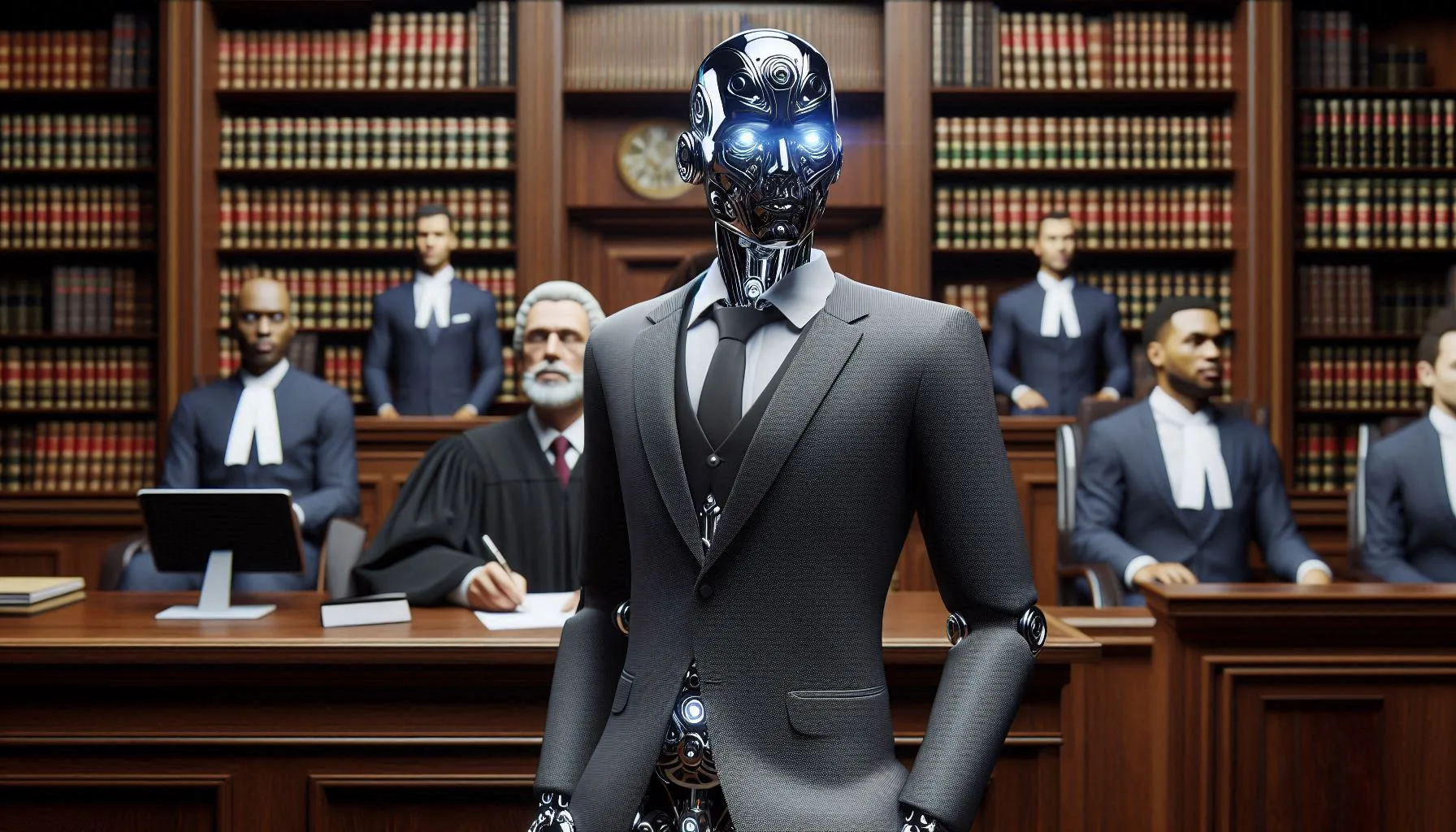The rise of artificial intelligence (AI) has disrupted many sectors, and the legal industry is no exception. As technology continues to evolve, the concept of AI taking on roles traditionally held by human lawyers has transitioned from science fiction to a plausible reality. In this article, we’ll explore how AI could potentially serve as a “lawyer” in the future, the current and future benefits of AI in the legal field, and the evolving role of AI within legal systems worldwide. We’ll focus specifically on the potential for AI to assume a lawyer-like role, highlighting its advantages, challenges, and ethical implications.
The Current Role of AI in Legal Systems
Right now, AI operates in legal systems more as an assistant than as a true “lawyer.” AI technologies help streamline workflows, analyze data, and assist with research and document review. Several companies have developed AI tools specifically designed for legal applications. These tools can review thousands of documents in minutes, assist in legal research, and even predict case outcomes based on past data.
Key Areas Where AI Is Already Impacting the Legal Field:
- Document Review and Discovery: AI tools are already making significant headway in the document review process. Law firms use AI to analyze large volumes of documents during the discovery phase, identifying relevant information and flagging important details. This saves countless hours and significantly reduces the cost of legal processes.
- Legal Research: AI-driven legal research tools are designed to quickly retrieve relevant case laws, statutes, and legal precedents. This efficiency enables lawyers to focus on strategic analysis rather than spending hours searching for applicable laws.
- Contract Analysis and Management: Contracts can be complex and time-consuming to review. AI-powered software can quickly read through contracts, identify risks, and even suggest revisions. This technology ensures accuracy and helps lawyers prioritize high-risk areas without sifting through every detail manually.
- Predictive Analytics: Some AI systems can predict case outcomes based on historical data. By analyzing previous court decisions, AI can estimate the likely verdict, helping lawyers strategize effectively. This predictive capability is beneficial in high-stakes litigation where understanding potential outcomes is crucial.
- Chatbots and Virtual Legal Assistants: Several law firms use AI-powered chatbots to handle initial client interactions. These bots answer common legal questions, help clients understand basic legal processes, and even schedule appointments. This feature improves customer experience and lets human lawyers focus on more complex tasks.
While AI is transforming the legal landscape, the big question remains: can AI fully replace human lawyers?
Can AI Truly Be a Lawyer?
For AI to truly become a “lawyer,” it would need to possess not only legal knowledge but also the ability to interpret laws, apply ethical reasoning, and make judgment calls that can change the course of people’s lives. These qualities require a level of nuanced thinking, empathy, and ethical sensitivity that AI currently lacks. However, advancements in machine learning, natural language processing, and robotics could bridge this gap in the coming decades.
Key Qualities Required for AI to Become a Lawyer:
- Deep Legal Knowledge: AI can easily be trained to learn legal information, and it already surpasses human lawyers in processing vast volumes of data. Advanced machine learning algorithms could, theoretically, analyze all laws, regulations, and precedents much faster than any human could.
- Interpretation and Contextual Understanding: One challenge for AI is interpreting laws within context. Laws often involve complex language and interpretations that vary by case. While AI can process data and follow algorithms, it lacks the ability to understand context as intuitively as a human lawyer.
- Ethical Decision-Making: Ethical considerations are at the core of many legal decisions. AI would need to be programmed to understand and apply ethical principles. However, ethics can be subjective, and programming “moral” AI is a challenge. Until AI can assess ethical implications independently, it will struggle to take on a true lawyer role.
- Emotional Intelligence and Empathy: A significant aspect of law practice involves client counseling, where emotional intelligence and empathy play a crucial role. Clients look to lawyers not only for legal advice but also for emotional support and assurance. AI cannot replicate the human qualities of empathy and trust-building, which limits its capacity as a lawyer.
- Advocacy Skills: Effective advocacy is a complex skill that combines knowledge, rhetoric, and presence. Lawyers use persuasive arguments and emotional appeals in court to sway judgments. AI might be able to construct logical arguments, but replicating the charisma and adaptability of a human lawyer remains a challenge.
Though AI lacks these qualities now, advancements in artificial general intelligence (AGI) may eventually equip AI systems with greater cognitive capabilities. Even then, the question of whether AI should replace human lawyers brings ethical considerations to the forefront.
How AI Could Serve as a Lawyer in the Future
While AI as a fully autonomous “lawyer” may still be decades away, there are several areas where AI could serve as a lawyer-like entity, especially in areas involving high-volume, low-risk cases or administrative legal tasks.
Potential Future Roles for AI in Legal Practice:
- Handling Routine Cases and Minor Legal Matters: In the future, AI could handle cases involving simple procedures, such as small claims, routine compliance issues, and low-level criminal offenses. These areas require less nuanced judgment and might be suitable for AI-led legal representation.
- Assisting in Mediation and Negotiation: AI could act as a mediator in disputes, using data-driven insights to help parties reach fair agreements. In negotiation, AI can provide impartial recommendations based on case data, streamlining settlements and avoiding costly trials.
- Public Legal Aid and Access to Justice: AI could bridge the gap in access to justice by providing basic legal advice to those who cannot afford traditional lawyers. AI-driven apps and platforms could offer guidance, helping individuals understand their legal rights and options. This could democratize legal assistance and make it accessible to broader populations.
- Supporting Judicial Decisions in Certain Cases: AI could assist judges by providing data-backed insights and case predictions, aiding in fair and unbiased judgments. However, AI as a judge or prosecutor would raise significant ethical questions, particularly around bias, transparency, and accountability.
- Specialized AI Legal “Consultants”: In complex fields like patent law, tax law, or corporate compliance, AI could function as a specialized consultant. By drawing on vast databases of legal precedents, statutes, and regulatory frameworks, AI could advise firms and individuals with near-instant accuracy.
Ethical Implications and Challenges of AI as a Lawyer
As AI’s role in legal systems expands, ethical questions around accountability, bias, and transparency arise. Legal decisions often have life-changing implications, so relying on AI in sensitive legal matters can be risky. Here are a few of the ethical concerns:
- Accountability: If an AI-driven legal assistant makes a mistake, who is responsible? Holding AI accountable is complex, especially when human lives or freedoms are affected. As AI becomes more integrated into legal systems, ensuring accountability will be a top priority.
- Bias and Fairness: AI models trained on biased data sets can inherit and amplify these biases. In legal contexts, where fairness is essential, bias can lead to unjust outcomes. Developers and legal professionals must work together to create algorithms that are as impartial as possible.
- Privacy and Data Security: Handling legal data requires strict confidentiality. Ensuring that AI systems meet data protection standards is crucial, as a breach of sensitive legal information could have severe consequences for individuals and organizations.
- Transparency and Explainability: AI models can be “black boxes,” making it difficult to understand how they reach certain decisions. For AI to operate in legal roles, it must provide transparent and explainable outcomes, especially when the public’s trust is at stake.
- The Human Element: Law often requires a personal touch. Clients, especially those involved in traumatic cases, rely on human lawyers for guidance and support. Replacing this human interaction with AI could undermine the relationship-based nature of legal representation.
Conclusion: AI as a Complement, Not a Replacement
In the foreseeable future, AI will likely serve as a complement to human lawyers rather than a full replacement. While AI excels in data processing, prediction, and routine legal tasks, it lacks the emotional intelligence, ethical reasoning, and contextual understanding needed to be a true “lawyer.” That said, AI will undoubtedly become an invaluable tool in the legal field, assisting with research, document review, case predictions, and access to legal aid.
Ultimately, AI’s future in law hinges on striking a balance between technological efficiency and human judgment. By embracing AI as a supportive asset, the legal industry can offer faster, more accessible, and more affordable services. For now, human lawyers are here to stay, but with AI’s ongoing evolution, the legal landscape is set to become more dynamic, innovative, and client-centric.




